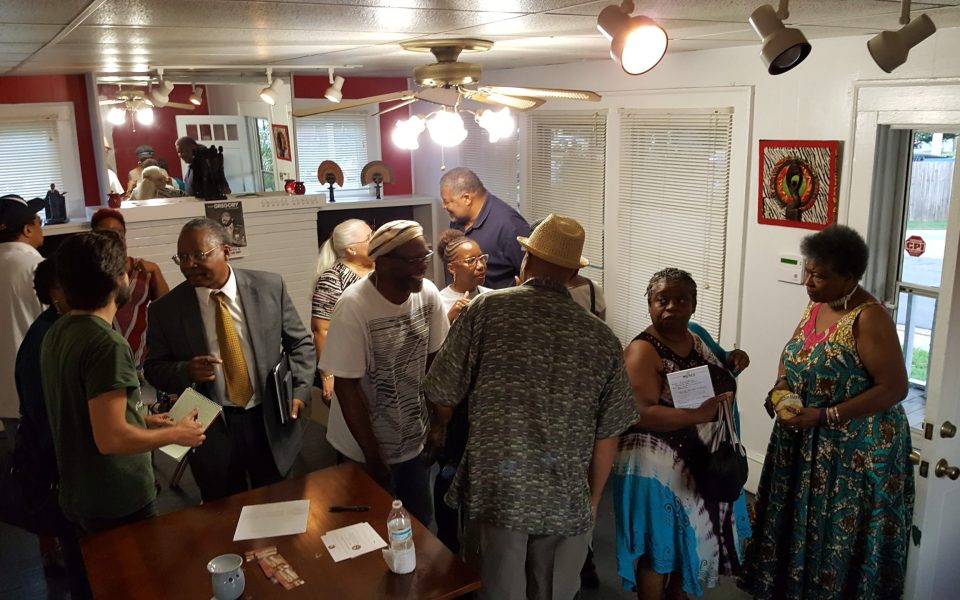When Dick Gregory stayed overnight at Cornell College in 1972, he asked for assistance with a very specific errand. One of the students stepped up to the task.
“I kept going to the store to get him his prune juice,” recalled Fleming El-Amin — now a Forsyth County Commissioner — at Triad Cultural Arts’ tribute to Dick Gregory. Known for his fasting, among other forms of dissent, some accounts say that Gregory went two and a half years without solid food in order to protest the war in Vietnam. The activist, comedian, writer and social critic died on Aug. 19.
As he had explained to El-Amin at the time, prune juice is a natural agitator.
And then again, so was Dick Gregory.
At Cornell, he showed students a video on the effects of Agent Orange, an implement of herbicidal warfare that the United States used to decimate the land and people of Vietnam. He stayed up talking to some of the students until 3 a.m.
“Dick,” an exhausted El-Amin finally said to Gregory. “I gotta get up in the morning.”
Though he may have been overwhelmed by Gregory’s fervor at the time, something stuck with El-Amin for the next 45 years.
“If you don’t wanna deal with the truth,” El-Amin said, “you don’t wanna deal with Dick Gregory.”
The tribute on Aug. 24 marked the first event at Triad Cultural Arts’ new center — a large house in Winston-Salem across from Forsyth Seafood and a stone’s throw from the busy Martin Luther King Jr. Drive. On a short residential street — home to an empty lot harboring a few cars and neighbors taking in the early evening from their front porch — only a “Tours, Classes, Festivals” banner outside the center unveils its mission as a place for public and educational programming.
The organization’s members hope the new building can become a forum for the exchange of ideas, encouraging public discourse about issues in the African-American community.
At the inaugural event, the focus on community and togetherness immediately emerged.
“What words come to mind when you think of Dick Gregory?” asked Mütter Evans, one of the evening’s discussion leaders, near the beginning of the event.
Thinker. In your face. Truth-teller. Bold.
“I’ll talk more later,” El-Amin said after finishing his Cornell tale. “Now I want to talk collectively.”
As the discussion continued, it became clear that El-Amin wasn’t the only one who had met Gregory in person. Somehow, it seemed almost all of the group had crossed paths with the late comedian in one way or another.
Miles Harry met him at Wake Forest University in the 1960s. Ken Rasheed once shared an elevator with him, not knowing what to say. Ed McCarter did a report on Gregory’s book, Nigger: An Autobiography, not long after its 1964 publication. Luci Vaughn got him to sign the same book a few years later.
Though the encounters differed from one another, Evans summed up what the entire group had come to understand.
“Dick Gregory was Dick Gregory, no matter where he was,” she said.
He had affected the lives of all those in attendance, whether or not they had the chance to meet him face to face.
“When I heard he had passed, it was like something was taken from us,” said Wendy Wallace. “That’s the reason I’m here right now.”
Carol McDowell agreed with Wallace’s sense of loss.
“You don’t realize the extraordinary value of someone until it’s snatched away,” she said.
But the tribute wasn’t only meant for remembrance and mourning. The group gathered so that they might use Gregory’s life to bring change to their own communities.
“I hope we can all adopt some of the things [Gregory] represented,” El-Amin said.
Evans encouraged the group with the same idea.
“What can we do in this community? How can we let his legacy live on?” she asked.
The conversation turned to education, a topic important to Gregory as well as all the tribute’s attendees.
“If we’re satisfied with the status quo, the status quo’s gonna go on,” Ken Rasheed said. “If kids fail the third grade, we know for a lot of them that means a next step is prison.”
Rasheed continued: “If kids are reading socially relevant material, their scores go up.” He talked to the group about his initiative to get an African-American history course taught in local schools, a class that would be required for graduation.
[pullquote]Learn more about Triad Cultural Arts at triadculturalarts.org.[/pullquote]
“Dick Gregory would ask: ‘Where are we headed?’” Evans commented.
At the new center, the group came together to remember Gregory and realize the lessons he has given them. The organization strives to address social issues and make lasting improvements in the community.
Its members want to deal with the truth. They want to deal with the life of Dick Gregory.
“He left us a lot,” Vaughn summarized. “He left us an awful lot.”
Join the First Amendment Society, a membership that goes directly to funding TCB‘s newsroom.
We believe that reporting can save the world.
The TCB First Amendment Society recognizes the vital role of a free, unfettered press with a bundling of local experiences designed to build community, and unique engagements with our newsroom that will help you understand, and shape, local journalism’s critical role in uplifting the people in our cities.
All revenue goes directly into the newsroom as reporters’ salaries and freelance commissions.


Leave a Reply